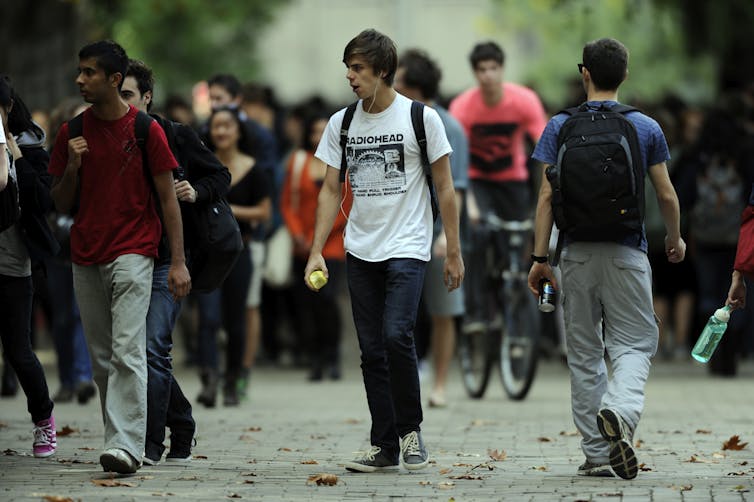Australia wants international students to stay and work after graduation. They find it difficult for 4 reasons
- Written by Danielle H. Heinrichs, Researcher, Griffith Institute of Educational Research, Griffith University

International students are flooding back[1] to Australian universities. Some predictions say 2023 could even see record numbers of overseas students in the country.
This is not only good news for universities, but potentially good news for Australian employers. Part of the Albanese government’s plan to boost skills in Australia is to try and ensure more students stay longer after they graduate and join the workforce.
Read more: The universities accord could see the most significant changes to Australian unis in a generation[2]
Education Minister Jason Clare recently announced[3] those with a bachelor’s degree could stay for four years, up from two, to “strengthen the pipeline of skilled labour”, particularly[4] likely to include graduates in healthcare, teaching, hospitality and accounting.
But the government’s simple policy change is not enough. It assumes graduates will be able to get jobs in the areas they studied. There are four key reasons why getting more skilled international graduates into jobs needs more than just a visa extension.
1. Not all graduates secure a job
Up to one-third[5] of international graduates who stay in Australia post-study are still unemployed six months after graduating. This is the case even with historically low[6] unemployment rates.
Full-time employment rates for international graduates are also consistently lower than for domestic graduates. For example, in 2021, the full-time employment rate for international graduates with an undergraduate degree was 43.0% compared with 68.9% for domestic graduates.
Many international students are self-funded and report[7] feeling stressed and under pressure to financially support themselves and their families due to the increased cost-of-living.
2. Or if they do find a job, it pays less
Finding well-paying employment in occupations related to a student’s field of study also takes time.
Many students and graduates report[8] they are taking jobs that are not related to what they have studied, often for low wages.
Studiesalso show[9] that even if international students with an undergraduate degree find full-time employment, they earn 20% less than domestic graduates.
3. There are not enough work experience opportunities
Another reason it is difficult for international students to get a job after graduating is the limited opportunity to work while they study.
Due to COVID and the push towards more online learning, work placements or internships have become scarce. In 2022, many universities have begun to offer internships again, but some students completed their studies without practical workplace experience.
Very few international students have local networks to draw on for job opportunities. They also tend to be less familiar with Australian workplace contexts and cultures and rely on internships[10] to get the experience they need to secure an ongoing job.
4. Employers are hesitant
A 2020 Deakin University report[11] found employers were hesitant to hire international graduates on temporary visas. Other research[12] also shows employers favour those with permanent residency because they see them as more likely to stay in Australia, and worth the investment in recruiting and training.
Research has also found[13] employers think international graduates will be more expensive to hire, and they would require more on-the-job training to be able to understand Australian workplace cultures.
Read more: The universities accord could see the most significant changes to Australian unis in a generation[14]
Some mistakenly think language will be an issue, not realising that all university graduates need to meet the minimum English language proficiency to gain entry into any university program.
Sometimes employers think[15] international graduates are not considered to be a good “cultural fit”. While cultural fit is a consideration when hiring, there is a real danger some employers are using this reason to discriminate against international graduates for no other reason other than their ethnic background.
International students are a trustworthy and valuable[16] source of productivity and workplace diversity – both of which are necessary to compete in a global economy. They have different skills sets, ideas, attitudes and cultural understandings that can expand how a business operates in a cultural diverse country.
What now?
So, giving international students more time in Australia is not the whole answer. They need better career support before and after graduation.
This includes work placements but also help preparing for job applications and interviews.
Employers also need to be better informed about graduates’ capabilities and the benefits of hiring international graduates.
References
- ^ flooding back (www.afr.com)
- ^ The universities accord could see the most significant changes to Australian unis in a generation (theconversation.com)
- ^ recently announced (www.pm.gov.au)
- ^ particularly (immi.homeaffairs.gov.au)
- ^ one-third (www.qilt.edu.au)
- ^ historically low (www.financeminister.gov.au)
- ^ report (www.tandfonline.com)
- ^ report (www.voced.edu.au)
- ^ also show (www.qilt.edu.au)
- ^ rely on internships (link.springer.com)
- ^ report (deakin.figshare.com)
- ^ research (www-tandfonline-com.libraryproxy.griffith.edu.au)
- ^ also found (www.deakin.edu.au)
- ^ The universities accord could see the most significant changes to Australian unis in a generation (theconversation.com)
- ^ employers think (www.tandfonline.com)
- ^ trustworthy and valuable (educoglobal.com)

















